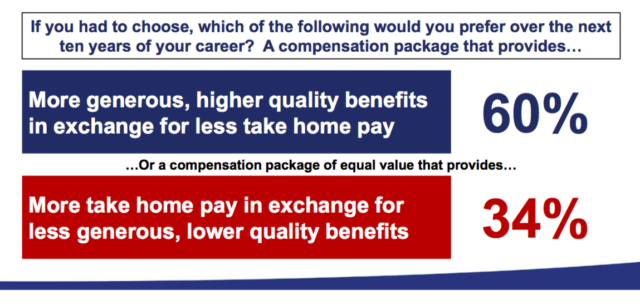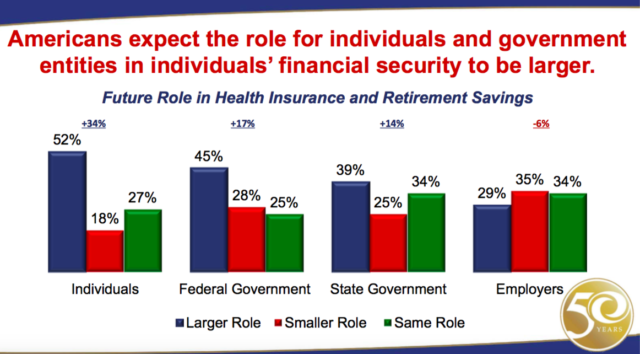A New Stock Market Game that Rewards Patience and Diversification
November 6, 2018
December 20, 2017

Would you rather have a more generous benefits package at work or a large enough pay raise to purchase an equal-value benefits package on the open market? Your answer says a lot about how confident you are handling money.
By a two-to-one margin, Americans would choose more generous benefits and pay less, according to a new survey from the American Benefits Council. In essence, most folks would rather be handed a standard set of benefits vetted by their employer than be given the money and responsibility for choosing themselves. And this is why, it is best to look up and find employee policy example online to know what you would need and want in an organization before joining!
On the surface, however, this might not make proper sense. It even stumps corporate benefit executives, who as a group believe employees would prefer higher pay to more generous benefits, according to the survey. Ultimately, designing your own benefits would allow you to, say, maximize child-care contributions in your 30s and 40s and favor something like a flexible work schedule in your 60s.
Why would anyone prefer a cookie-cutter benefits package over one that is tailored to their needs and has identical economic value? In part, at least, they must lack the confidence to make these kinds of money decisions.
That speaks to a lack of financial education in schools and the workplace. We are turning out generation after generation of individuals who are afraid to make decisions that will affect their financial future.
Just five states earned an A for financial literacy instruction in public schools, according to a recent study. A third of adults have no savings; 60% do not have a budget and 22% do not pay their bills on time.

The one time individuals seem to prefer taking charge of their money is after winning the lottery-when they believe they have so much money it will never run out. But winners who choose a lump sum payout…
• • •
…over a monthly check are more likely to go broke than the average American. Up to 70% of people who receive a cash windfall lose it all within three years, according to the National Endowment for Financial Education.
So, yes, workers are willing to punt on mega issues like retirement and healthcare. Hands down, these are their most prized benefits, according to the survey. A bad choice now could be devastating down the road. So, they are willing to forego more pay and the freedom to design their own benefits to receive less pay with the safety of employer-vetted benefits.
Workers generally trust their employer to do right by them. In the survey, they said they trusted their employer above all other stakeholders to make the right healthcare choice for them.

Yet employers score less well when it comes to trusting their retirement plan. On that issue, workers trust the financial services industry more, according to the survey. Which further prompts the question: Why wouldn’t workers swap lesser retirement benefits for higher pay that they could use to get a personal financial plan? A lack of financial confidence is the best explanation.
Employees understand they must ramp up their money smarts. Asked who will play a bigger role in their healthcare and retirement security over the next 10 years, “individuals” was the top answer. They expect employers to play a lesser role-perhaps acknowledging the decades-long shift of responsibility to individuals from government and corporations.
That acknowledgement is a good thing. It means employees should be more open to taking advantage of the financial wellness programs that are fast becoming part of the modern benefits package. Even as individuals choose to punt on big financial decisions they understand that important money choices will be landing in their lap more often. Now, if we can just get the education system to help prepare them.
Financial Confidence ‘Temperature’ Needs To Be Just Right
Amid Crippling Inaction at State Level, Financial Education May Bubble Up
Why Your Company Must Offer A Financial Wellness Program
Posted in Adults on December, 2017
Sign Up to receive the Right About Money Report
Sign Up to receive the Right About Money Weekly Digest
|
Tired of Your Cubicle? Try a Trade Read More |
|
What Monkeys Can Teach Us About Money Read More |
|
Maryland bills call for financial literacy courses in schools, prisons Read More |
|
England faces ‘crisis’ in adult financial literacy Read More |
|
How to explain to a child when you can’t (or don’t want to) buy something Read More |
|
The future of financial education Read More |
|
CFPB issues fifth Financial Literacy Annual Report Read More |
|
Arkansas Schools To Teach Financial Literacy Read More |
|
Eureka! to foster STEM education for girls in Pittsfield Read More |
|
Money on the mind: Personal finances a major stressor for many Canadians Read More |
|
How Nostalgia Can Help You Save Money Read More |
|
Financial literacy topping Treasurer Fitch’s platform Read More |
|
Apps to make your kids smart about money Read More |
|
Study reveals how personal keepsakes can help you save money Read More |
|
Personal finance seen as big gap in Mass. education landscape Read More |
|
UK investors feel let down over financial education Read More |
|
State senator pre-files financial literacy bill Read More |
|
Missouri financial literacy programs promote importance of loan repayment Read More |
|
Visa launches interactive financial literacy-themed play Read More |
|
AI is disrupting the labor market. Here’s what educators need to know Read More |
|
Missouri adopts revised personal finance standards for students Read More |
|
94% of Americans failed this financial quiz—here are the 4 hardest questions Read More |
|
Child’s higher education more important than retirement saving for Indians: Survey Read More |
|
India moves closer towards achieving its goal of financial inclusion Read More |
|
Cashless kids: Is tap-and-go technology promoting financial illiteracy? Read More |
|
Young Adults Say Financial Literacy Offers More Benefits than Other High School Subjects Read More |
|
Fiji Ministry of Education takes up stewardship of Financial Education Program Read More |
|
Why everyone’s racing to help us know more about money Read More |
|
‘Financial capability’ should be part of school curriculum says Retirement Commissioner Read More |
|
The Simple Reason Millennials Are Saving More for Retirement Read More |
|
Dodgers and unlikely teammates help local kids hit a home run Read More |
|
Biz Kid$ financial education TV program returns for Season 6 Read More |
|
Why Law School Students Need a Financial Education, Too Read More |
|
Habitat NZ looks to build financial literacy in Samoa Read More |
|
Why there needs to be a ‘financial fitness revolution’ Read More |
|
Regulators in India team up for financial inclusion Read More |
|
Regent universities will ask new students to complete online financial literacy course Read More |
|
How parents can prepare children to handle wealth after inheritance Read More |
|
Prudential Cambodia achieves major milestone Read More |
|
Older Women Flunk Financial Literacy Quiz Read More |
|
Some different advice for this year’s graduates Read More |
|
3 biggest money mistakes you’re teaching your kids Read More |
|
More Australian students to benefit from new funds for financial literacy Read More |
|
Two Surveys Reveal Financial Literacy, Behaviors of Millennials and Gen Z Read More |
|
Sabah lauds move to raise financial literacy Read More |
|
New Florida law requires colleges to spell out student debt Read More |
|
Creating capacity and capability in India’s wealth sector Read More |
|
Stash Secures $40M in Funding to Meet Demand for Its Financial Education Platform Read More |
|
Use summer break to teach your children about finances Read More |
| Read More |
|
Companies offer “financial wellness” programs as a job perk Read More |
|
Equifax and Junior Achievement Americas Expand Financial Inclusion Program in Latin America Read More |
|
Chauncey Billups serves Denver youth as rumors with Cavs swirl Read More |
|
Financial literacy can lower political cost of pension reform Read More |
|
Why It Pays To Start Financial Education Early Read More |
|
Ask an Attorney: How can I teach my child about finances? Read More |
|
Most of us are overconfident about our financial knowledge – that’s a risk Read More |
|
Why does China top the ranking in financial literacy? Read More |
|
House subcommittee hearing looks at impact, opportunities of fintech Read More |
|
Why India needs to work on financial literacy now more than ever Read More |
|
Education system overhaul should include new emphasis on financial literacy Read More |
|
ARE YOU EMBRACING THE 4 C’S OF FINANCIAL LITERACY? Read More |
|
Survey Shows Those Working WIth Advisors Less Financially Literate Read More |
|
NBA Philippines draws up new gameplan for financial planning Read More |
|
Dollars and sense: Canadian teens rank among highest internationally in financial literacy Read More |
|
Atomic Weapons Establishment launches online financial education program Read More |
|
High school seniors learn how to save now so they can spend later Read More |
|
USAA Invests Nearly $2 Million in STEM, Financial Literacy Hub Read More |
|
Ontario elementary students MUST get financial literacy lessons too Read More |
|
Students learn financial literacy with lemonade Read More |
|
Why technology is key to financial wellness success Read More |
|
Rural financial education project launched in Beijing Read More |
|
Canadians Share What They Wish They Learned About Money Read More |
|
Too Many Products, Not Enough Education Hampers Financial Wellness Plans Read More |
|
48% say financial education would help them save for retirement Read More |
|
High schoolers can now earn a $1,000 scholarship for completing a free financial literacy course Read More |
|
Encourage financial literacy by speaking to clients’ emotional priorities Read More |
|
SHIFTING FROM FINANCIAL EDUCATION TO FINANCIAL CAPABILITY Read More |
| Read More |
|
Raise your financial literacy and become a banking guru Read More |
|
study shows students want better financial information sooner Read More |
|
Is It Racist to Teach Students Financial Literacy Read More |
|
New Charity Makes Financial Education Accessible to Everyone Read More |
|
7 Steps Toward Financial Literacy For Your Children Read More |
|
Portugal to boost financial literacy of football players Read More |
| Read More |
|
How Financial Knowledge Drives Wealth Inequality Read More |
|
Investment Platform Stash Reveals Findings from First Financial Literacy Survey Read More |
|
Kerala Gramin Bank reaches out to schools with financial literacy agenda Read More |
|
Only 24% of irish people believe they are financially savvy Read More |
|
What Makes Workplace Financial Education Work? Read More |
|
Professors give themselves a ‘B’ in financial literacy Read More |
|
Lack of Financial Literacy Costs Americans over $9,700 across their Lifetimes Read More |
|
As More Women Become Leaders, Financial Literacy Is a Key Ingredient Read More |
|
New Personal Finance Index Identifies Gaps In Financial Literacy Among American Adults Read More |
| Read More |
|
BANZAI, 10,000 YEARS OF FINANCIAL LIFE Read More |
|
‘Is that a want or a need?’ Financial literacy starts in 4th grade Read More |
|
Lawmaker says NJ school kids should learn about student debt Read More |
|
Financial Mistakes We Can Avoid If We Learn About Money Earlier In Life Read More |
|
Financial literacy essential for growing generations Read More |
|
Law would require Nevada schools to teach financial literacy Read More |
|
Students struggle with financial literacy amidst rising costs Read More |
| Read More |
|
Advisers not best to teach financial literacy, ASIC says Read More |
|
Florida Lawmakers: High Schoolers Need More Financial Literacy Read More |
|
Financial literacy paradox: Banking curriculum Read More |
|
Are UK employees crying out for financial wellbeing training? Read More |
|
The Future Of Financial Education: The Financial Sector Needs To Step-up Read More |
|
RBI asks Financial Literacy Centres to hold special camps on going digital Read More |
|
Past-Due Medical Debt, Partially Linked to Financial Literacy, Has Declined Read More |
|
BUILDING FINANCIAL LITERACY IN HIGH SCHOOL SO KIDS DON’T RACK UP HUGE COLLEGE LOANS Read More |
|
Helping financial educators pave the road to higher credit education in Mississippi Read More |
|
Campaign aims to increase money-management skills Read More |
|
New Finance Center at HSSU Aims to Address Financial Literacy Read More |
|
BUSINESSES MUST SUPPORT FINANCIAL EDUCATION IN SCHOOLS Read More |
|
Treasurer Fitch Pushes Gender Pay, Financial Literacy Despite Bills Dying Read More |
|
Wealth Inequality and Financial Education during the Trump Administration Read More |
|
Hong Kong’s Inaugural Money Month Launched Read More |
|
Designing an Effective Financial Literacy Program Read More |
|
Military personnel speak up for beleaguered consumer agency Read More |
|
$2M donation will create financial education center in Bismarck Read More |
|
Director Richard Cordray Remarks at Financial Literacy and Education Commission Read More |
|
Courage, not Literacy, Key to Financial Wellness Read More |
|
Questioning the Value of Financial Education Read More |
|
4 in 5 financial advisers in Australia willing to volunteer coaching financial literacy Read More |
|
Quebec high school finance course ‘concocted by the banks,’ according to unions Read More |
|
Junior Achievement Worldwide Launches A Version In Ghana Read More |
|
Colorado Attorney General launches FinLit program at Mountain View Core Knowledge Read More |
|
Lack of financial literacy a setback Read More |
|
Schwab to Fund Matching Donations for Financial Literacy Projects in Public Schools Read More |
| Read More |
|
Student Investing Championship Launched to Find Best University Student Talent Read More |
|
Our Grandparents Learned Personal Finance in School. Why Can’t Our Children? Read More |
|
Kiss-A-Pig secures a $5300 grant for local High School Read More |
|
Miss Auburn Candidate Promotes Financial Literacy Read More |
|
Being money smart with your sweetheart Read More |
|
Ghana bank promotes financial literacy through Monopoly Read More |
|
How to help distressed employees during tough financial times Read More |
|
Larry Fink calls on CEOs, money managers to teach financial literacy Read More |
|
Iowa Lawmakers to Consider Mandatory Financial Education Read More |
|
Students Become Bank Tellers in This Iowa City Read More |
November 6, 2018
September 26, 2018
September 19, 2018
September 12, 2018
September 27, 2017
February 28, 2017
October 4, 2017
November 6, 2016






